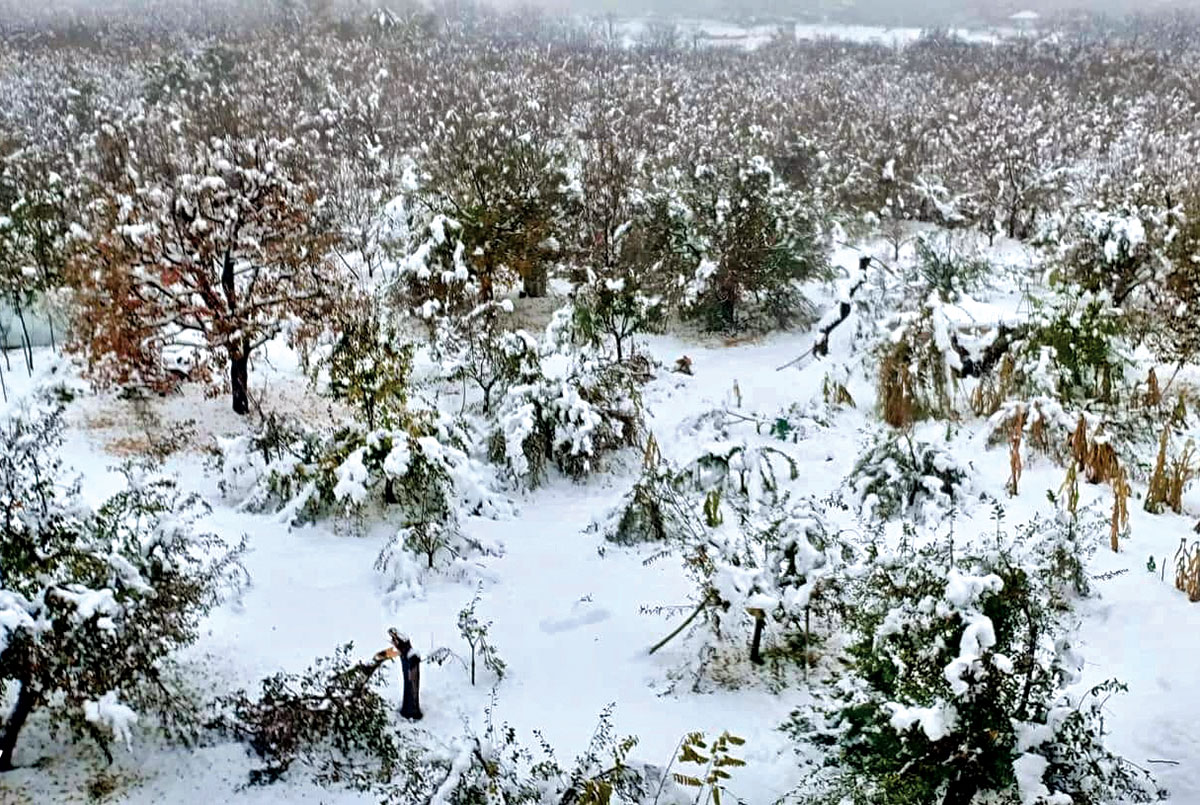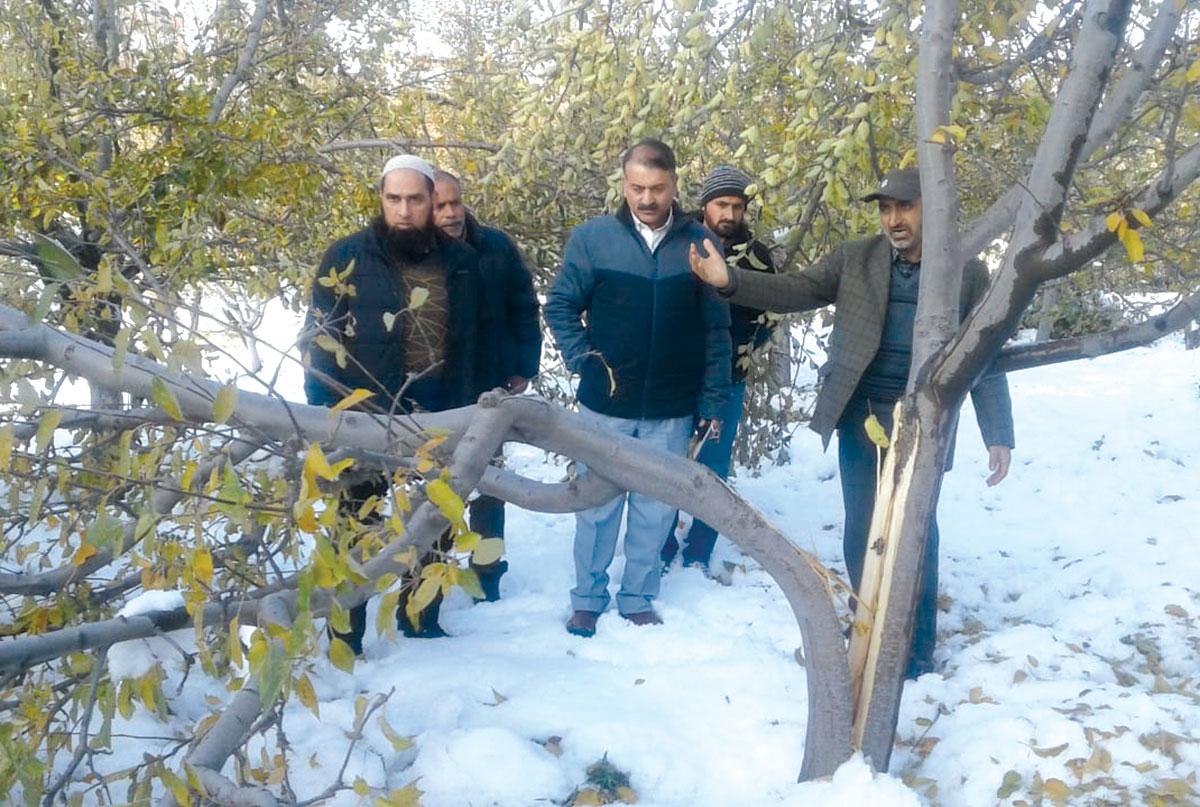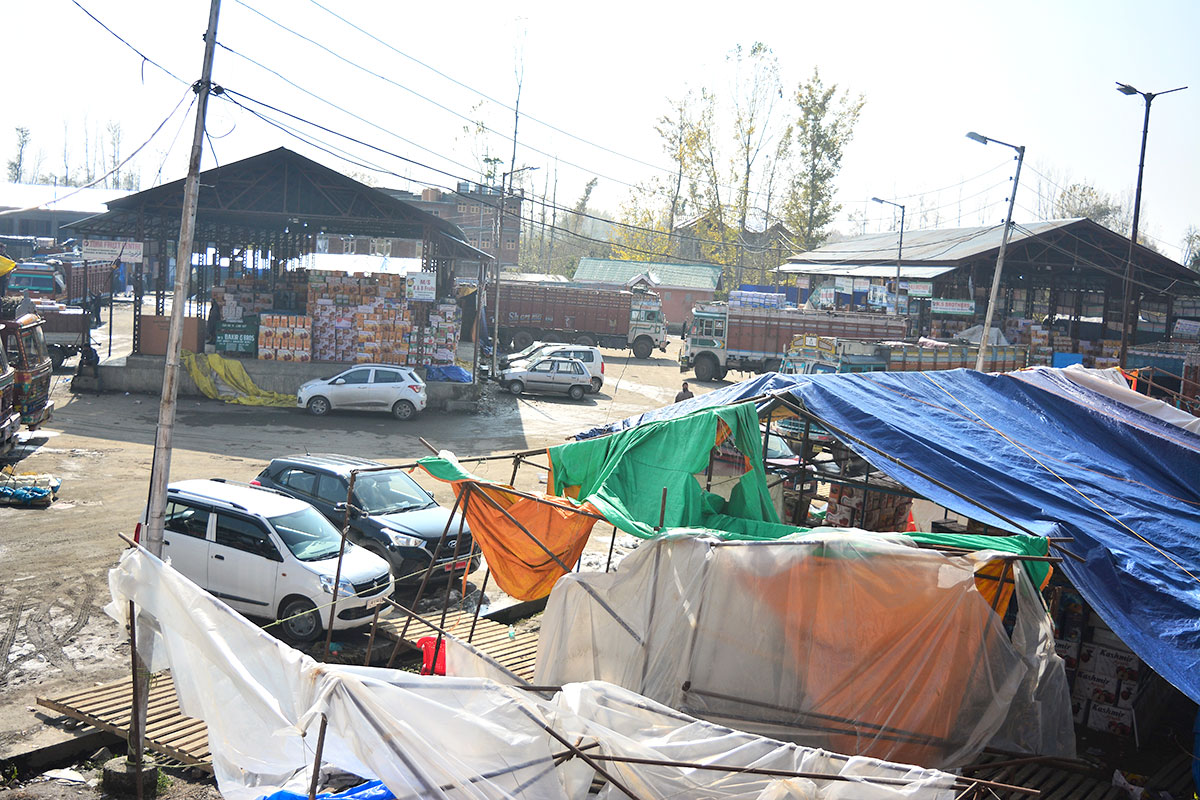As the growers were busy managing the sale of bumper crop amid glut and surging freight and diminishing returns, nature struck a fatal blow, reports Aaqib Hyder

The weather shock came when the peripheral fruit markets were doing their best. In comparison to 2017 autumn, when 6,729,420 apple boxes (107650 metric tons) were dispatched from Pulwama mandi, officials said they had already dispatched 6,975,325 boxes (111,605 metric tons) by the end of October in the current year. The quantum of ‘exports’ had jumped in Shopian and Kulgam mandis also.
“Although this year it was a bumper crop, rates have dropped by an average of Rs 100, a box. The freight has gone up by Rs 20 – 30 per box,” an official of Horticulture Department in Shopian, said. “Despite all this, our mandi has already crossed a turnover of Rs 200 crore, and we have reports that the turnover of mandis in Pulwama is higher.”
Growers were in a rush to dispatch the produce. Though a chain of controlled atmosphere storage has come up in Lassipora, growers’ say it is still far less than the basic requirement. Given the unreliability of road and the weather, growers are keen to quickly sell their apple harvest even if it fetches less than their expectations.
Over the years, a section of growers would prefer selling their produce in local mandis because it would avoid managing whopping freight and sideline third party involvement. Growers would get in touch with buyers and sell their produce swiftly without paying for travel to outside mandis.
But political uncertainty created a dent. Some growers feel the frequent gun-battles coupled with Panchayat election triggered some sort of a crisis. They preferred dispatching the fruit directly to outside markets.
“I don’t trust the situation,” Lateef Ahmad Dar, a fruit grower from Kulgam, said. “Things can turn ugly anytime. I sent my produce directly to mandis outside the state. Although the transportation charges had bearing on my earnings I feel certain about the end result. The commission is taken by local mandis (6%) also gets excluded.”

The ailing highway continues to be the pain for the farming community.“We sent our produce four days before Diwali thinking that it will reach Delhi a day or a two before the festival but it took almost a week to reach the destination,” Ghulam Mohammad Banday, who leads the Kulgam fruit grower association, said. “The fruit when stranded for days loses its quality. When the road opens, hundreds of trucks reach the market same day thus altering the supply-demand balance and results in price fall.”
It was in this backdrop that the weather took a bad turn. It shifted priorities of the entire periphery as the 5-inch wet snow added enormous weight to the green trees, some still carrying fruit, that the trees collapsed. The youngest and the oldest trees suffered the extensive damage. “The weight broke them in four pieces to the trunk level,” Waseem Wani, a Shopian grower said. “It is a misfortune. I am unable to comprehend the crisis. My four small orchards are literally sleeping.”
“I had taken a bank loan to invest in my orchard, and now with everything damaged, I don’t know how to pay that off with no money in hand,” Ghulam Qadir Malik, who has an orchard over 23 kanals of land in Shopian lamented.
A large quantity of harvested apple was waiting to be packed in orchards stands damaged completely. Malik says that whatever little produce they could salvage from under the snow is not worth sending to market. “When kept in sub-zero temperature, frost gets into apples, thereby rendering them tasteless and of no use,” he said.
The loss is two-pronged and has its own diversity. Crop loss is of two types: the harvested apple that remained buried under snow, and the fruit that was caught by the snow while on trees. In both the cases, it is now C-category fruit. Estimates suggest that this loss may run in many hundred crores.
The major loss is that of trees. The younger ones bent under the weight but a number of them broke into pieces. The older one either were uprooted or simply sliced into pieces.

“Right now, we are using the old system that was already in vogue,” Waseem said. “If the broken major branches are not sliced away from the trunk, we re-assembly them, tie them with jute rope and drill a screw in it. Then we apply a paste that can help it reconnect and re-grow. But the trees are approaching winter dormancy and the main season of snow is starting. There is not much hope.”
Before the vagaries of weather, the farmers have no explanation. The common lament is pannie gounah (our own sins). Some of the well-read growers have started talking about government’s failure in issuing timely advisories or not extending the crop insurance beyond Jammu.
“Crop insurance scheme has been approved by the state cabinet almost six years back but it is yet to be implemented in Kashmir,” Abdul Salam from Drubgam Pulwama said. “Jammu being part of this same state is already reaping its benefits. We fail to understand why such delay is being allowed while our entire livelihood is at stake.”
Governor’s administration has ordered for surveys and it will take its own time. “As per the quick survey, we found 15 lakh trees covering 6000 acres of orchards were damaged,” Deputy Commissioner, Anantnag (Islamabad) Mohammad Younis, said. “We have more than 71 lakh fruit-bearing trees and this assessment is quite preliminary. It will take us some more time to get the exact status of loss.”
By later next week, the real extent of damage will be known. Estimation indicates a net 30 per cent perishing of the adult, fruit-bearing trees. Various estimations are in the public domain but the losses are nowhere less than Rs 500 crore.
Despite putting the loss to his orchards at Rs 1.5 lakh – only for the fruit, Shahnawaz Khanday, an orchardist from Shopian says that he is lucky to have incurred comparatively less loss than others.
“One of my orchards is badly damaged. Another one is unaffected to some extent. There are many neighbouring orchards which have trees as well as apples damaged in their entirety. Considering that, I feel I am lucky.” he said.
The snowfall has devoured the festivity and activity from the local fruit markets. Pulwama has its main mandi spread over 34.2kanals in Prichoo and another one, bit smaller, in Pachhar area. The fruit mandi in Prichoo, 3 km from the main town, gives an impression of a slum at first. Multi-coloured tarpaulin tents scattered around like trash and stray dogs roaming around make it look shabby. Once inside, everyone seemed to wear a sullen and blank face. Some were erecting the damaged makeshift tents while the rest were either basking in the autumn sun or haggling with buyers from outside the state.
“We had our harvested fruit in mandis at the time of snowfall which gave us a false hope that this calamity spared our produce,” Javed Ahmad while erecting his dismantled tarpaulin tent said. “Unfortunately, the tents under which we had our fruit were damaged and the cardboard boxes along with the fruit were drenched in water and snow,”.
Seated on a neat leathery chair in his rather dingy office inside the Pulwama fruit mandi, Feroz Ahmad Malik, an official of horticulture department informed that thousands of apple boxes were damaged inside the mandi alone.
“Non-availability of shops and shelter in the mandi forces people to put their stock in open or in small makeshift tents. Around 10,000-15,000 apple boxes, the ones with cardboard packing, in particular, were damaged by the snowfall,” he said.
Concerned over the fate of the horticulture industry in the coming years, Malik says that the coming season is very crucial as far as the production is concerned.“These losses apart, it can get worse in the coming days,” he said. “The ravaged trees will have grave long-term repercussions and recurring losses in future.”
A distressing video of an affected apple grower widely shared on social media platforms serves as a perfect depiction of the tragedy that has befallen the horticulture sector. In the video, the grower is seen bitterly crying and frantically trying to salvage apples buried under mounds of snow. While invoking Allah’s mercy, he is helplessly leaping from one heap of apples to another only to find them damaged by the snow.
Apple is the main shaker and mover of Kashmir’s peripheral economy. With handicraft sliding and the tourism not actually taking off, the apple is the main moneymaker.
Kashmir grows apples on around 1.5 lakh hectares of land producing more than 70% of India’s apple basket. Its average turnover is Rs 6500 crore. Next season may be challenging and trying for all within and outside Srinagar.















